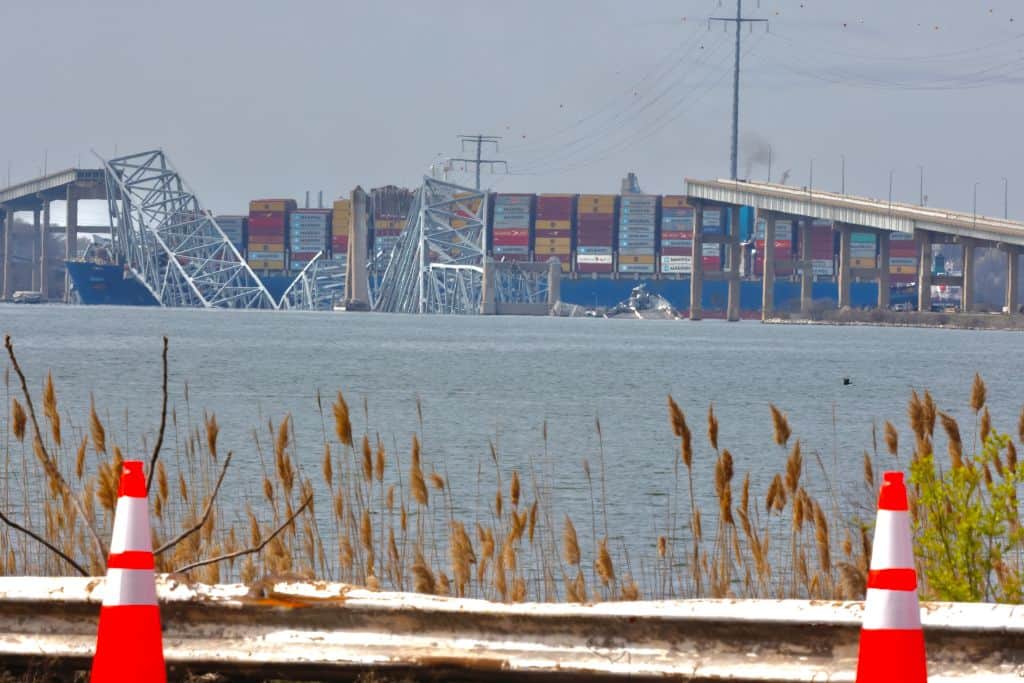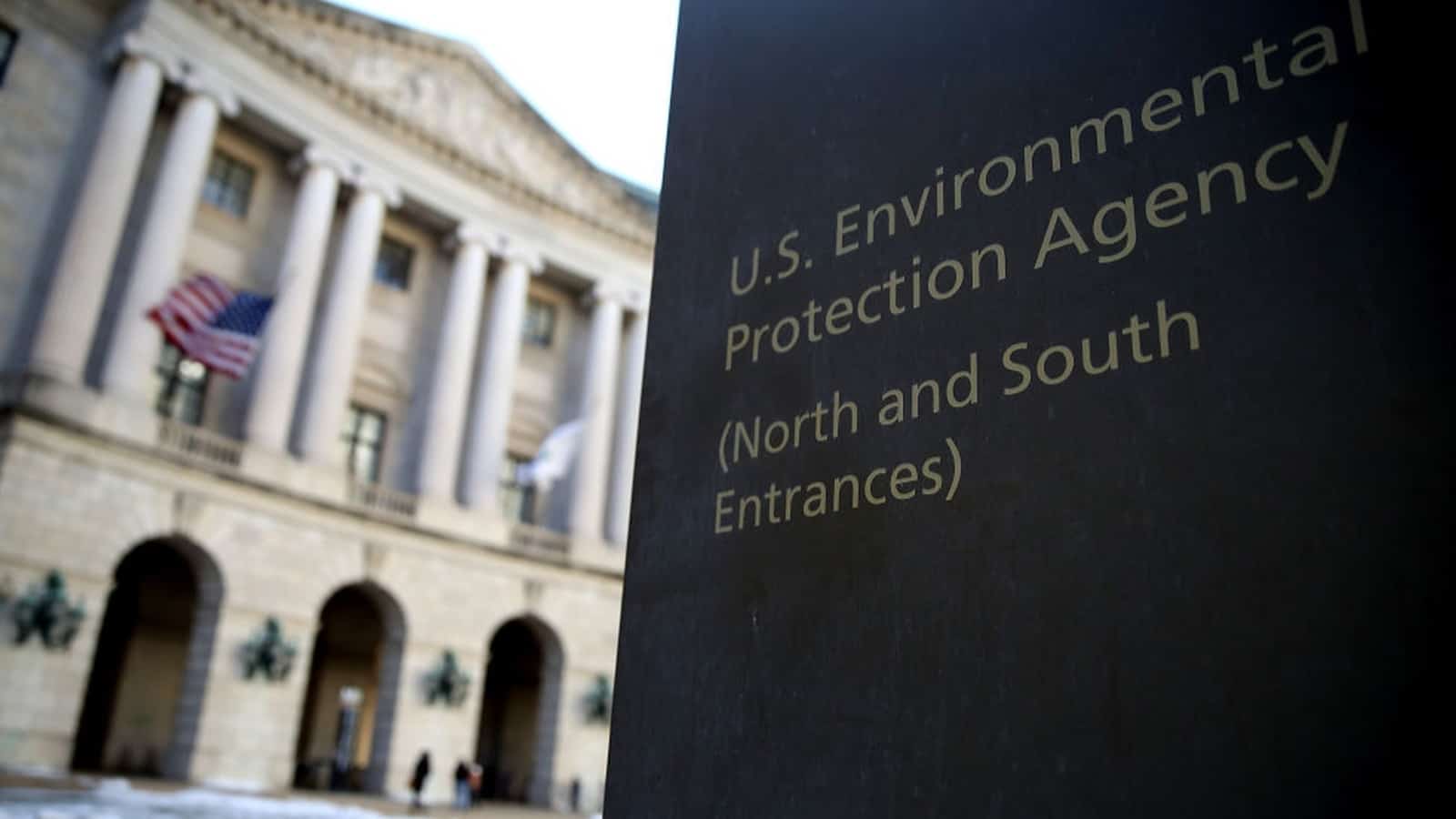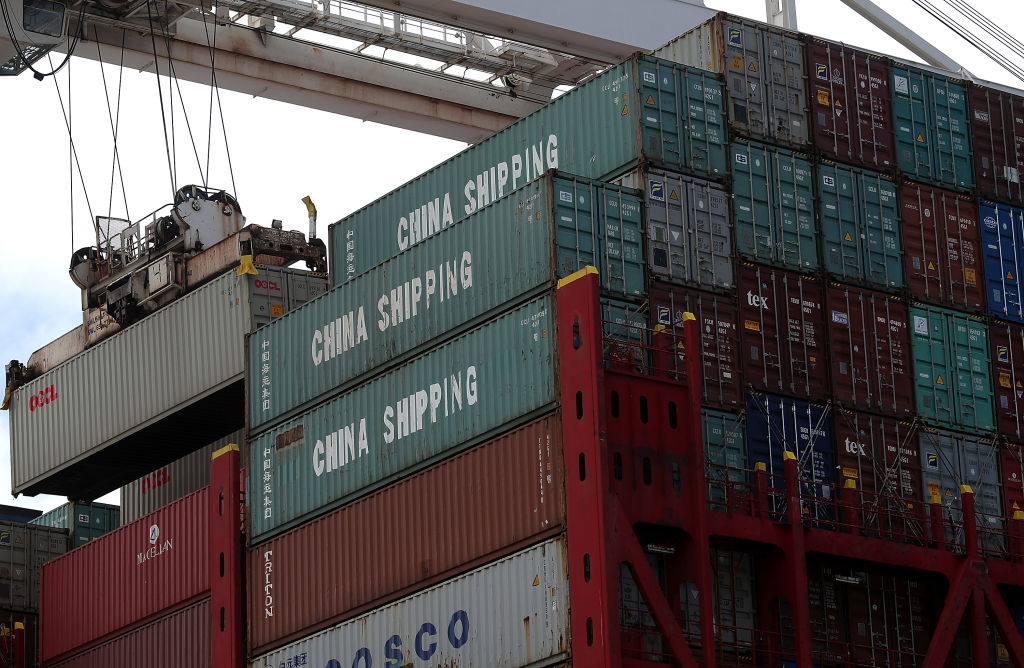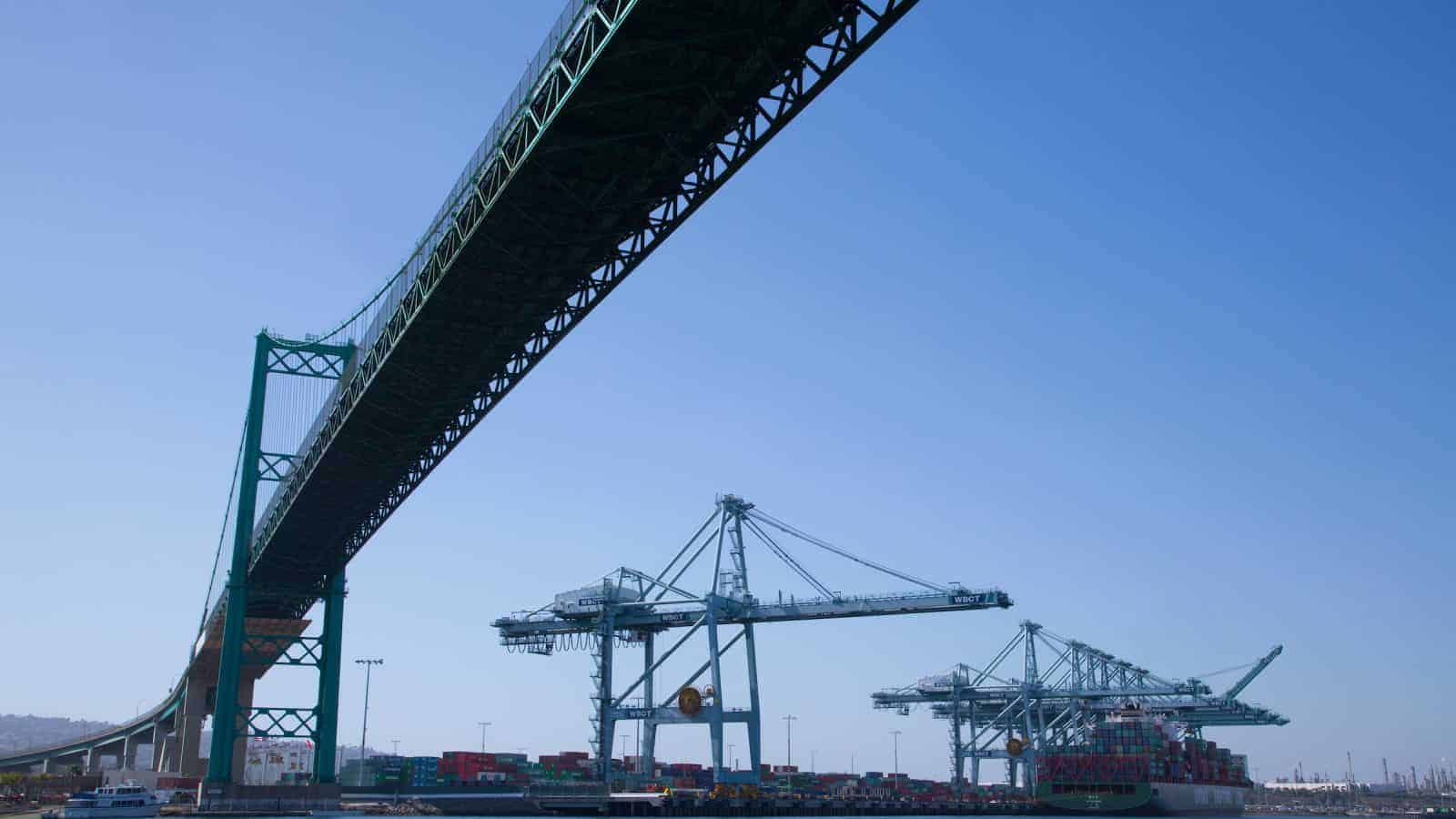Baltimore Bridge Collapse to Hit Shipping, Port Jobs

Vessel traffic in and out of the Port of Baltimore—which contributes $15 million a day in economic activity, Business Insider reports—was suspended Tuesday after a container ship hit the Francis Scott Key Bridge in the early morning. The collision caused the bridge to collapse, sending at least seven vehicles and their occupants into the Patapsco River, according to the Baltimore Sun (subscription).
What’s going on: “Officials, who spoke amid a continuing and massive search and rescue mission, said the port was not shut down and remained open to process trucks inside terminals.”
- Other ports are likely to be able to absorb container ships headed for Baltimore, The New York Times (subscription) reports.
Why it’s important: “The port, which generates more than 15,300 direct jobs, had rebounded from global supply chain difficulties and disruptions during the coronavirus pandemic and hit records last year for handling cargo,” according to the Baltimore Sun. “It is the nation’s 16th busiest port, ranking first for volume of autos and light trucks, roll-on/roll-off heavy farm and construction machinery, imported sugar and imported gypsum.”
- Baltimore is the closest Atlantic port to major Midwestern manufacturing hubs.
- Truckers are concerned about increased congestion resulting from the closure, “particularly because deliveries such as hazardous material loads cannot travel through Interstate 895 or I-95 tunnels.” Trucking companies are already warning customers of delays for shipments going through the Mid-Atlantic, according to The Wall Street Journal (subscription).
- In addition to affecting consumers in the Baltimore area, the traffic stoppage is likely to affect jobs at the port.
Manufacturers on Emissions Standards: Challenges Still Lie Ahead
Washington, D.C. – Following the Environmental Protection Agency’s release of new automobile emissions standards, National Association of Manufacturers President and CEO Jay Timmons released the following statement:
“Auto manufacturers in America make enormous investments to both improve the efficiency of their vehicles and provide numerous options for consumers. While it is clear the EPA listened to manufacturers’ concerns about the timeline of this rule, challenges still lie ahead. Successful implementation of this policy will still require congressional action on the permitting reforms needed to build the charging infrastructure to support this transition. That includes the ramping up of electricity production and developing a reliable domestic supply of critical minerals.
“Manufacturers will continue to engage with EPA Administrator Regan and President Biden as a more realistic standard is needed to harmonize this rule with other regulations governing vehicle emissions so that we can grow the sector in the United States.”
-NAM-
The National Association of Manufacturers is the largest manufacturing association in the United States, representing small and large manufacturers in every industrial sector and in all 50 states. Manufacturing employs nearly 13 million men and women, contributes $2.85 trillion to the U.S. economy annually and accounts for 53% of private-sector research and development. The NAM is the powerful voice of the manufacturing community and the leading advocate for a policy agenda that helps manufacturers compete in the global economy and create jobs across the United States. For more information about the NAM or to follow us on Twitter and Facebook, please visit www.nam.org.
NAM Poll Shows Americans Overwhelmingly Oppose LNG Export Pause; Support All-of-the-Above Energy Approach
Houston, Texas – The National Association of Manufacturers released the results of a new poll today showing bipartisan opposition to the Department of Energy’s freeze on export permits for new liquified natural gas projects. Respondents also strongly believe that the United States should pursue an all-of-the-above energy strategy, which includes supporting our global allies by providing cleaner, American-produced natural gas.
“The American public agrees: LNG exports are critical to U.S. energy security, creating well-paying jobs and supporting our allies in Europe and Asia. This poll underscores the need for President Biden to immediately direct the Department of Energy to roll back this misguided and counterproductive policy,” said NAM President and CEO Jay Timmons. “President Biden’s manufacturing legacy is at risk if the DOE and other federal agencies continue to act in direct contradiction to the stated goals of the president and the American people of bolstering manufacturing competitiveness in the U.S.”
The NAM analytics team conducted the poll March 15–18 and collected 1,000 responses from a nationwide sample of registered voters.
Key Findings:
- 87% of respondents agree the U.S. should continue to export natural gas.
- 76% of respondents agree with building more energy infrastructure, such as port terminals, here in the U.S.
- 74% of respondents agree with boosting production of domestic oil and natural gas in the U.S. instead of depending heavily on foreign energy sources.
- 72% of respondents prefer that American energy policy use an all-of-the-above strategy that includes oil and natural gas and renewable energy sources.
- 86% of respondents agree that we should change the permitting system so it doesn’t take so long for new energy infrastructure projects to be approved.
Background: On Jan. 26, the DOE announced a freeze on export permits for new LNG projects. Europe is the primary destination for U.S. LNG, accounting for 67% of total exports in the first six months of 2023. According to the DOE, Russian natural gas exports have 40% more global warming potential than U.S. LNG across 20 years. Russian gas also had 20% more global warming potential than European coal.
Read the full poll results here.
-NAM-
The National Association of Manufacturers is the largest manufacturing association in the United States, representing small and large manufacturers in every industrial sector and in all 50 states. Manufacturing employs nearly 13 million men and women, contributes $2.85 trillion to the U.S. economy annually and accounts for 53% of private-sector research and development. The NAM is the powerful voice of the manufacturing community and the leading advocate for a policy agenda that helps manufacturers compete in the global economy and create jobs across the United States. For more information about the NAM or to follow us on Twitter and Facebook, please visit www.nam.org.
Americans Oppose LNG Export Pause, NAM Poll Finds

Americans overwhelmingly support exporting U.S. natural gas, a new NAM poll reveals.
What’s going on: In addition to wanting continued exports of LNG, respondents believe the U.S. must boost its production of oil and natural gas, build more energy infrastructure and reform the broken permitting system, according to the findings of an NAM survey of 1,000 registered voters conducted March 15–18.
- In January, the Biden administration announced a moratorium on LNG export permits.
- Europe is the primary destination of exported U.S. LNG.
The details: Among the survey’s key findings:
- Some 87% believe the U.S. should continue exporting natural gas.
- About 86% say the permitting system must be changed so energy projects are approved and online in less time.
- Approximately 76% say the U.S. needs more energy infrastructure, such as port terminals.
- About 74% say the U.S. needs to increase domestic oil and natural gas production.
- And 72% would like to see the U.S. use an all-of-the-above energy approach that includes both traditional and renewable energy sources.
The last word: “The American public agrees: LNG exports are critical to U.S. energy security, creating well-paying jobs and supporting our allies in Europe and Asia,” said NAM President and CEO Jay Timmons.
- “This poll underscores the need for President Biden to immediately direct the Department of Energy to roll back this misguided and counterproductive policy.”
U.S. “Very Concerned” About Critical Minerals

The Biden administration is “very concerned” about U.S. reliance on China for critical minerals, U.S. Energy Secretary Jennifer Granholm said Wednesday, according to CNBC.
What’s going on: China’s dominance in the world’s critical minerals supply chain is “one of the pieces of the supply chain that we’re very concerned about in the United States,” Granholm told the news outlet on the sidelines of the International Energy Agency’s 2024 Ministerial Meeting in Paris.
- China produces approximately 60% of all rare earth elements, which are critical to alternative-energy technologies, such as electric vehicles.
Why it’s important: “As part of a rapid uptick in demand for critical minerals, the IEA has warned that today’s supply falls short of what is needed to transform the energy sector,” according to the article.
What the administration is doing: Both production and processing of critical minerals “have to be addressed,” Granholm said.
- “And that’s why we are working very closely to ensure that we have identified which raw materials [or] critical minerals we need to be able to do our transition to a clean energy economy.”
The NAM says: “Other countries are taking all possible measures to develop domestic sources of critical minerals, and it should be a wake-up call to the U.S. that we need to be doing the same,” said NAM Vice President of Domestic Policy Brandon Farris. “We also need to reform our broken permitting system to get these projects operational as soon as possible.”
NAM to Senate: LNG Pause Harms Allies, Security

A senior Department of Energy official told the Senate at a Thursday hearing that the Biden administration’s recent decision to pause liquefied natural gas export permits will neither affect supplies to U.S. allies nor jeopardize international energy security, Reuters reports.
- Yet, data supplied by the NAM to the Senate Committee on Energy and Natural Resources ahead of the hearing shows otherwise.
What’s going on: “‘It will not affect our ability to supply our allies,’ [U.S. Deputy Energy Secretary David] Turk said, adding that it does not affect already approved exports.”
- “A U.S. official earlier on Thursday told Reuters ‘I don’t think we’re concerned at all about our ability to meet (European) demand.’”
- The Senate hearing on the LNG permit export pause follows a House hearing on the same topic earlier in the week.
However … Since the 2022 start of Russia’s war against Ukraine, Europe has come to rely increasingly on the U.S.—the world’s top LNG exporter—for natural gas, the NAM told lawmakers.
- “Europe is currently the primary destination for U.S. LNG, accounting for 67% of total exports in the first six months of 2023,” NAM Managing Vice President of Policy Chris Netram said. “For comparison, 64% of the United States’ global LNG exports in 2022, and 23% of American exports in 2021, went to the European Union. … [T]he war in Europe [even] forced diversions of LNG cargo that was bound for Asia.”
“Wrong direction”: Sen. Joe Manchin (D-WV), who called the hearing, said freezing liquefied natural gas export permits is “the wrong direction for our country,” whose LNG exports are helping allies in need.
- “Shockingly, in the White House statements [regarding the permit freeze], there is no reference at all to the crisis created by Putin’s invasion of Ukraine, to the growing instability in the oil-and-gas-producing regions in the Middle East following Hamas’ attack on Israel or to any other crisis that U.S. LNG exports can help address.”
Environmental concerns: Though “Turk said the review will also consider pollution impacts on people living near LNG facilities … [and] ‘take into account all of the health environmental impacts,’” CNBC reports, the permit freeze could “benefit producers of energy sources with significantly higher emissions than [U.S.] LNG,” Netram continued.
- “According to the DOE, Russian exports to Europe had 40% more global warming potential than U.S. LNG across 20 years. Russian gas also had 20% more global warming potential than European coal. Clearly, U.S. LNG exports are better for the environment and help the U.S. and our allies achieve our climate goals.”
What’s next: The moratorium “could face court challenges,” according to CNBC. “A group of 23 Republican state attorneys general in a letter sent to the administration on Tuesday [said] that the Biden administration’s pause is illegal, arguing that the natural gas law requires the DOE to approve LNG exports unless it shows that doing so would not be in the public interest.”
EPA Releases Punishing New Air Standard

In a move that could have a significant negative impact on manufacturing in the U.S., the Environmental Protection Agency on Wednesday finalized an update to the federal air quality particulate matter standard.
What’s going on: The EPA announced a significantly stricter National Ambient Air Quality Standard for fine particulate matter (PM2.5), lowering the level from 12 micrograms per cubic meter of air to 9 micrograms.
The background: America’s air is actually cleaner than ever, due in large part to manufacturers’ commitment to innovation.
- In fact, the EPA recently reported that PM2.5 concentrations have declined by 42% since 2000.
- Yet, last year, the agency signaled that it was considering lowering the standards even further, to as low as 8 micrograms per cubic meter—and while the NAM and manufacturers spoke out against the move, the EPA moved ahead.
The problem: If enacted, such an aggressive standard would make it far more difficult and costly for manufacturers to operate in the United States.
- It would put huge swaths of the country in “nonattainment,” meaning that they would not meet ambient air quality standards. Factories in nonattainment areas would be unable to operate. Permitting would become almost impossible, and economic development would grind to a halt.
- A recent NAM-commissioned analysis by Oxford Economics found that a standard at this level could reduce GDP by nearly $200 billion and cost as many as 1 million jobs through 2031.
Our take: “The Biden administration’s new PM2.5 standard takes direct aim at manufacturing investment and job creation in direct contradiction to the president’s stated goal of strengthening manufacturing in communities all across America,” said NAM President and CEO Jay Timmons.
- And it will “mak[e] an already gridlocked permitting system further gridlocked” and discourage long-term investments by manufacturers.
Unfair disadvantage, tough choices: It would put the U.S. at a disadvantage with global competitors, too, Timmons added.
- “Manufacturers in America will also be hard pressed to make long-term investment plans domestically as our global competitors have set more reasonable goals. The EU standard is currently 25, and a proposal there would be to reach 10 by 2030. The UK has a target of 10 by 2040.”
- And it would require state and local officials to make difficult decisions about which critical infrastructure projects in their areas move forward, Timmons continued.
High cost, little impact: What’s more, the tightened rule won’t address the greatest sources of particulate matter, according to NAM partners the American Forest & Paper Association and American Wood Council.
- The “EPA’s rule delivers a devastating blow to U.S. manufacturing and the economy while doing nothing to address the largest sources of particulate matter, including wildfire smoke,” they said in a joint statement. “This unworkable air rule undermines President Biden’s promise to grow and reshore manufacturing jobs.”
- “This administration has set the PM2.5 NAAQS at near background levels, ensuring permit gridlock for most manufacturing sectors around the country, while failing to address 84% of overall PM2.5 emissions.”
Next steps: The NAM has spoken out repeatedly against this stricter regulation and will continue to call on Congress to reverse it.
NAM in the news: AFP, Associated Press, Fox News, Daily Caller and Newsweek all covered the NAM’s response to the finalized rule.
The last word: “The U.S. already has some of the strictest air standards in the world, and thanks to manufacturers’ innovation and leadership, some of the cleanest air and best environmental records,” Timmons concluded. “Manufacturers will consider all options to reverse this harmful and unnecessary standard, because it is our duty to stand against policies that hold our country back.”
Manufacturers: New EPA Rule Directly Undermines President’s Manufacturing Agenda
Washington, D.C. – Following the decision by the Environmental Protection Agency to lower the National Ambient Air Quality Standards for fine particulate matter (PM2.5) to 9 micrograms per cubic meter, National Association of Manufacturers President and CEO Jay Timmons released the following statement:
“The Biden administration’s new PM2.5 standard takes direct aim at manufacturing investment and job creation, in direct contradiction to the president’s stated goal of strengthening manufacturing in communities all across America.
“The new standard of 9 and the EPA’s paltry 60-day implementation window will guarantee projects currently under permitting review will have to comply with this onerous decision, making an already gridlocked permitting system further gridlocked.
“Manufacturers in America will also be hard pressed to make long-term investment plans domestically as our global competitors have set more reasonable goals. The EU standard is currently 25, and a proposal there would be to reach 10 by 2030. The UK has a target of 10 by 2040.
“Governors and mayors will now have to make difficult decisions under this untenable standard. New manufacturing investments envisioned by the CHIPS and Science Act, the Bipartisan Infrastructure Law and the energy provisions of the Inflation Reduction Act will be subject to these new requirements. This revised standard will force some communities to choose which—if any—investments can proceed without running afoul of the EPA’s decree.
“By implementing such a radical standard here, our country is ceding our competitive advantage with an unforced error. All of these choices could have been avoided with a more sensible standard and a longer implementation runway.
“The EPA itself says that some 70% of particulate matter comes from nonmanufacturing sources, such as wildfires (29%), agriculture and prescribed fires (15%), crop and livestock dust (12%), unpaved road dust (10%), paved road dust (3%) and “dust” (2%). Before forcing actions that will curtail manufacturing investment and infrastructure development, the federal government should first determine how to deal with what is occurring naturally.
“To be sure, manufacturers proudly stood up for funding in the Bipartisan Infrastructure Law, CHIPS and Science Act investments and many of the policy provisions outlined in the IRA. But there is no doubt that our country will be unable to realize the benefits of these legislative accomplishments with this new rule in place. As counties and cities find themselves in nonattainment, this grave mistake will drive investment away from the United States, derail permitting and weaken the economy for all.
“The U.S. already has some of the strictest air standards in the world, and thanks to manufacturers’ innovation and leadership, some of the cleanest air and best environmental records. Manufacturers will consider all options to reverse this harmful and unnecessary standard, because it is our duty to stand against policies that hold our country back.”
Background:
Per the EPA: Nonattainment is any area that does not meet (or that contributes to ambient air quality in a nearby area that does not meet) the national primary or secondary ambient air quality standard for NAAQS.
The EPA recently reported that PM2.5 concentrations have declined by 42% since 2000, driven by major emissions reductions from both mobile sources and the power sector. As a result, America’s air is cleaner than ever.
-NAM-
The National Association of Manufacturers is the largest manufacturing association in the United States, representing small and large manufacturers in every industrial sector and in all 50 states. Manufacturing employs nearly 13 million men and women, contributes $2.85 trillion to the U.S. economy annually and accounts for 53% of private-sector research and development. The NAM is the powerful voice of the manufacturing community and the leading advocate for a policy agenda that helps manufacturers compete in the global economy and create jobs across the United States. For more information about the NAM or to follow us on Twitter and Facebook, please visit www.nam.org.
NAM Pushes for Transparent Conclusion of Tariff Review

The Biden administration is nearing the end of a lengthy review on whether to adjust or extend tariffs on a variety of goods and materials from China—and the NAM is working to make sure manufacturers’ voices are heard.
The background: Following a 2017 investigation into China’s trade practices, the Trump administration put in place a set of levies on imported goods from China—called Section 301 tariffs—intended to incentivize change in practices by China that were found by the Office of the U.S. Trade Representative to be “unreasonable or discriminatory.”
- These included policies and practices related to technology transfer, intellectual property and innovation.
The review: In May 2022, USTR initiated a legally required four-year review of the Section 301 tariffs that focused on tariff efficacy in changing Chinese discriminatory practices and the impact of the tariffs on the U.S. economy, workers and consumers, among other considerations.
- More than 18 months later, the review remains unfinished. The NAM is urging USTR to finish and publish it—and to take actions that reduce the burdens on manufacturers while maintaining appropriate leverage to incentivize China to adhere to bilateral and multilateral commitments.
- “Ideally, USTR will conclude the four-year review in the next few weeks and make the results public,” said NAM Senior Director of International Policy Ali Aafedt. “We would like to see the results reflect the 1,498 public submissions USTR received during the process and the reduction or removal of some of the tariffs that are harming manufacturers in the U.S. more than they’re creating leverage on China.”
The exclusions: There are 429 existing exclusions from the tariffs—including 77 COVID-19-related products and 352 reinstated exclusions—which are in effect through May 31.
- The NAM has also been pushing for a new process that allows manufacturers to ask the government to exclude specific products they need from the tariffs.
- “The NAM has been calling for a new, fair and transparent Section 301 tariff exclusion process that would allow all U.S. stakeholders an opportunity to seek relief or weigh in on the existing tariffs,” said Aafedt. “The last opportunity to petition USTR for relief from Section 301 tariffs was in 2020, and a new exclusion process will help to better align the tariffs with U.S. economic goals.”
The outlook: Reports such as this one from The Wall Street Journal indicate that the Biden administration will look to rebalance the tariffs, potentially reducing those that are not in the U.S. interest and raising tariffs on other items, including, potentially, on imports from China in the electric vehicle and battery sectors.
- “The NAM will continue to push for a more strategic approach,” said Aafedt.
If your company has interest in a specific existing exclusion, USTR is seeking feedback here by Feb. 21.
Timmons: Biden Administration’s Agencies Are Undercutting the President’s Own Stated Goals Again with LNG Decision
Washington, D.C. – Following the Department of Energy’s announced freeze on export permits for new liquified natural gas projects, National Association of Manufacturers President and CEO Jay Timmons released the following statement:
“Once again the Biden administration’s agencies are undercutting President Biden’s own stated goals. The president has said the following:
- ‘Where is it written that America can’t lead the world in manufacturing again? … Now, thanks to all we’ve done, we’re exporting American products and creating American jobs.’[1]
- ‘This nation used to lead the world in manufacturing, and we’re going to do it again.’[2]
- ‘We just have to remember who we are. We’re the United States of America…There’s not a single thing we can’t do when we put our minds to it. And we can strengthen our energy security now, and we can build a clean energy economy for the future at the same time. This is totally within our capacity.’’[3]
- ‘[W]e’re working closely with Europe and our partners to develop a long-term strategy to reduce their dependence on Russian energy.’[4]
- ‘[W]e’re a great nation. We’re the greatest nation on the face of the earth. We really are. That’s the America I see in our future.”[5]
“Manufacturers call on the president to direct his agencies to support his agenda and to end their political war on the manufacturers who power American jobs, our economy and our national security. Today’s decision weakens our country, while giving Russia an upper hand as Europe and Asia look to transition their energy needs.”
[1] State of the Union Address, Feb. 7, 2023.
[2] Remarks at a Political Rally Hosted by Union Members, June 17, 2023.
[3] Remarks on Actions to Strengthen Energy Security and Lower Costs, Oct. 19, 2022.
[4] Remarks Announcing U.S. Ban on Imports of Russian Oil, Liquefied Natural Gas and Coal, March 8, 2022.
[5] Remarks at First Campaign Speech of the 2024 Election, Jan. 5, 2024.
-NAM-
The National Association of Manufacturers is the largest manufacturing association in the United States, representing small and large manufacturers in every industrial sector and in all 50 states. Manufacturing employs nearly 13 million men and women, contributes $2.85 trillion to the U.S. economy annually and accounts for 53% of private-sector research and development. The NAM is the powerful voice of the manufacturing community and the leading advocate for a policy agenda that helps manufacturers compete in the global economy and create jobs across the United States. For more information about the NAM or to follow us on Twitter and Facebook, please visit www.nam.org.
